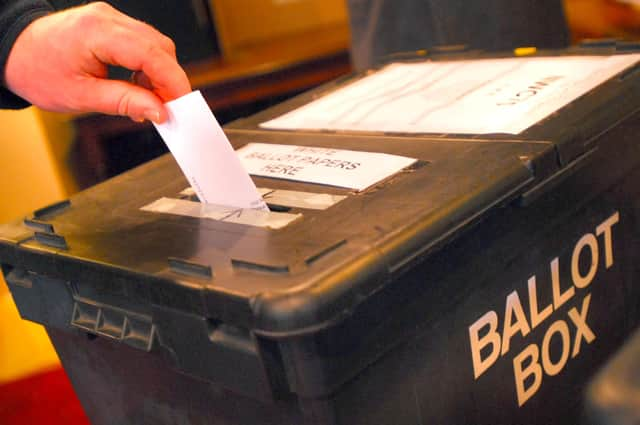Merits and drawbacks of compulsory voter ID at elections debated by Adur councillors


Lee Cowen (Lab, Mash Barn) asked councillors to oppose the introduction of voter ID which could be required if the Elections Act (2021) is passed.
“Unnecessary barriers to voting are likely to reduce voter participation in elections, proper representation of all parts of the community and so legitimacy of those elected to office,” Mr Cowen argued.
Advertisement
Hide AdAdvertisement
Hide Ad“The introduction of photo ID as a requirement to vote would be a threat to our
democratic traditions and would be likely to reduce participation in our elections.”
Mr Cowen said there was ‘no evidence of large-scale electoral fraud’ which he said would justify the legislation and likened the move to ‘using a sledgehammer to crack a nut’.
Compulsory voter ID could pose a barrier to marginalised and deprived communities, Mr Cowen added, as they may not have photo ID.
Advertisement
Hide AdAdvertisement
Hide Ad“Probably everybody in this room has ID but I can tell you there are a lot of people out there who don’t,” he said.
Mr Cowen also argued that the cost of providing voter cards to people without ID would likely fall on local councils.
Debs Stainforth (Lab, Southlands) said: “What worries me is that people will be disadvantaged by this process and excluded from democracy.
“My nan never had a passport in her life, or a driving licence.”
Advertisement
Hide AdAdvertisement
Hide AdThis was seconded by Gabe Crisp (Green, St Nicolas) who said it can be ‘extremely expensive’ to buy a passport or get a driving licence.
But council leader Neil Parkin (Con, St Nicolas) said there was ‘no big conspiracy to affect deprived people’.
He pointed out that many students have NUS cards, older people have bus passes, and disabled people may be blue badge holders.
“My own personal view is I’d like to see compulsory ID and compulsory voting as well,” he said.
Advertisement
Hide AdAdvertisement
Hide AdGovernment research found that 96 per cent of respondents had suitable photo ID with a ‘recognisable picture’.
Andy McGregor (Con, Widewater) was one of those opposed to the motion.
“There is so much wrong with this motion,” he said.
“We can be sure that voter fraud goes on and that, in the past, elections have been affected by that fraud.
“The proposal in the Queen’s Speech is to improve the democratic process.
Advertisement
Hide AdAdvertisement
Hide Ad“I’m sure we all agree that prevention is far better and far more effective than detection and prosecution.”
Mr McGregor pointed out that Adur District Council would have no say on the Elections Act.
He said he was ‘disappointed’ and ‘angry’ that councillors and council staff were ‘risking disease’ by extending the meeting to hear Mr Cowen’s motion.
In response, Mr Cowen said: “We’re here for democracy – we’re not here to see how quick we can get out of the door.
Advertisement
Hide AdAdvertisement
Hide Ad“I’ve never denied there’s electoral fraud – there is. But certainly not on the scale it should be to bring in legislation like this.”
Angus Dunn (Con, Hillside) said he was ‘undecided on the issue’ but remained ‘unconvinced’ by the motion as he felt that Mr Cowen had ‘cherry-picked’ statistics to ‘prove his point’.
“Participation in local elections is absolutely vital and the way we do that as local politicians is getting in front of residents and persuading them to vote,” he added.